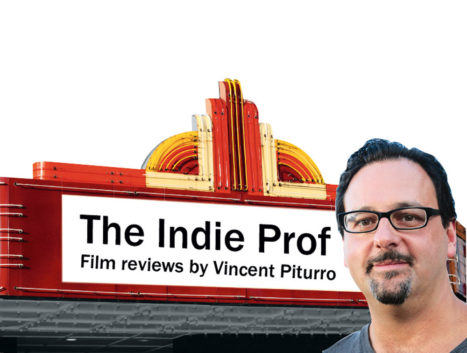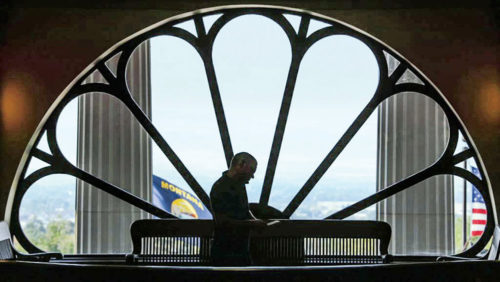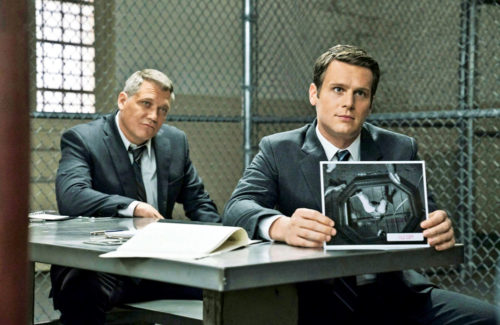
Each month, the Indie Prof reviews a current film in the theater and second film or series available on DVD or instant-streaming service. Follow “Indie Prof” on Facebook for updates about film events and more reviews.
Dark Money (2018)

Dark Money
I have written elsewhere about the decline of investigative journalism and how documentary filmmakers are filling that void and frequently acting as investigative journalists. In their absence, I argued, documentary filmmakers must do more to investigate, inform, and issue calls to action. Dark Money, a recent documentary that found favor at Sundance this year, is one such film.
“Dark Money” is the political term for advertising/campaign finance money that can’t be traced. The film chronicles a case study in such dirty politics, and the unlikely setting is Montana. In 1912, Montana passed the Corrupt Practices Act to outlaw corporate money in politics after two copper mining interests attempted to the “buy” the legislature in their 1894 state elections. Jumping ahead in time, the Citizens United Supreme Court decision in 2012 opened the floodgates for corporate money in elections, but Montana fought back—winning in the Montana State Supreme Court. That case eventually wound up back in the U.S. Supreme Court, with Montana losing their right to enforce their own state laws. Corporate money won.
The film then follows one reporter (who eventually loses his job when the paper folds) and his crusade to expose the corrupt practices of corporations. His story about the case of a state lawmaker who received illegal dark money forms the bones of the film, and we see that case through to judgment. Along the way, we make stops at Sen. John Tester’s farm, the Helena State House, the Federal Elections Committee, and various diners around Montana. Everyone agrees that the issue is not a matter of Right or Left, but one of fairness.
This is a straightforward, informative documentary that doesn’t try to be anything else. It is not highly stylized nor are there any particularly compelling figures. The most striking images come from old footage: In one scene, miners from the Anaconda Mining Company (circa 1930s) are locked into their elevator and sent down to the mines; the scene mirrors the great Sci-Fi epic Metropolis, where exploited workers were similarly turned into caged drones. Moments like this break the stream of information and provide needed visual relief.
If you are looking for a compelling, fast-moving, stylized documentary, this may not be for you. If you want to be informed and educated, and you want investigative journalism to thrive, then you found your film. I highly recommend it.
You will like this film if you enjoyed An Inconvenient Truth, Gasland, and/or Food Inc.
Starts August 3 at the Esquire. Sara Arnold, a Denver native featured in the film, will be in attendance during opening weekend.
Mindhunter (Netflix)

Mind Hunter
At first glance, it would seem a bit macabre to enjoy a series about serial killers. And that is exactly the subject of this biting Netflix series: serial killers. The specific take on the genre is where this series finds its uniqueness, however. We follow the beginnings of the FBI unit that focused more on psychology and less on the simple motives of individual crimes, which eventually led to an FBI focus on such murders; in fact, the term “serial killer” was invented during this period in the 70s. The show itself follows two agents—Holden Ford (Jonathan Goff) and Bill Tench (Holt McCallany)—who are loosely based on real-life agents John Douglas and Robert Ressler. Those two agents fought the system to bring criminal psychology and criminal profiling into the FBI. It was not without controversy.
This show is tailor-made for long-form TV: a feature-length film could not have given us the character development, the background, and the level of detail that makes this such a compelling show. Goff and McCallany are excellent in their respective roles; Goff in particular injects a boyish naiveté into the character that works marvelously as the season moves along. The characters play well off each other—often in tight spaces and almost always under difficult circumstances. The settings are particularly expressive: their offices are located in the basement of the FBI building, pointing to their low status among other agents.
The stars of the show are the material and the subject—how the agents met with real serial killers and based their profiling on those interviews. The specific matrix and scientific method was helped along by Boston College Professor Ann Wolbert Burgess (played by a serious and conflicted Anna Torv), and the interactions between the agents and the serial killers really form the crux of the series and provide many of the dramatic moments. Sitting inches away from the violent killers—who are sometimes irascible and sometimes mellifluous, yet always intriguing—provides the tension that balances the more intellectual aspects of the show. All of these elements add up to fascinating and beguiling viewing. Spend some time with this one.
You will like this if you enjoyed Zodiac, Silence of the Lambs, and/or Nightcrawler.
Season One is on Netflix
Vincent Piturro, Ph.D., is an associate professor of Cinema Studies at Metropolitan State University of Denver. He can be reached at vpiturro@msudenver.edu.



0 Comments